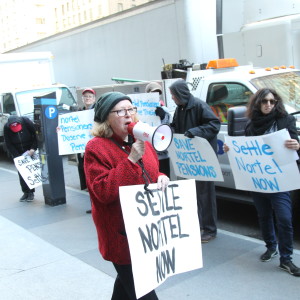Mediation resumes Thursday in the ongoing saga of Nortel’s bankruptcy. After seven years of lawyers and accountants raking in unprecedented fees and experts raising concerns about the broader economic implications of the case, it’s possible this round of mediation could present the best opportunity for resolution as current exchange rates would give international creditors a windfall and economic uncertainty incentivizes quick action.
Last week, a Delaware federal judge declined to rule on the appeal of the May 2015 decision from courts in the U.S. and Canada to pay a pro rata distribution to the parties. He recommended the case go directly to the U.S. Court of Appeals for the Third Circuit. Earlier in May, the Supreme Court of Canada declined to hear an appeal of the case.
Nortel’s $7.3 billion in remaining assets sit in a lockbox containing U.S. dollars. Most of this money will be split between creditors in the U.S., U.K., and Canada, and the dollar is currently very strong against the currencies of these other countries. In comparison to the exchange rates at the time of the May 2014 allocation hearing, Nortel’s assets are today worth an additional 764 million British pounds and 1.28 billion Canadian dollars.
The promise of a larger payout is an incentive to act quickly in the mediation. Currency markets may face significant instability in the months ahead as the U.K. votes on its possible exit from the E.U. on June 23. A public opinion poll showing Brexit slightly favored sent the pound sharply lower on Wednesday. But other polls continue to indicate the U.K. likely to remain in E.U. The uncertainty surrounding the vote and the rumblings in currency markets regardless of the outcome would be an incentive during this round of mediation to reach an agreement and take advantage of the favorable exchange rates available.
A quick resolution in mediation is both the only way to lock in the exchange rates and the only way to quickly return money to creditors. Even if the Appeals Court were to rule immediately, creditors would not receive any payout for some time. Instead, the funds would remain in the lockbox in U.S. dollars, and creditors would see no money until claims reconciliation is concluded.
“Regardless of how long it takes to appeal the Allocation Decision in the U.S. or Canada, there are significant, time-consuming proceedings that must occur before the decision could be given effect,” explains the U.S. bondholders’ letter to the federal judge in Delaware. “Under the ‘modified pro rata’ allocation approach, funds will not be released from the lockbox until claims reconciliation processes have been completed by each debtor in every jurisdiction. These processes have continued to go forward during the pendency of this appeal and both can and will go forward whether appeals are pending or not. They are extremely complicated and contentious and could take significant additional time to complete…”
An agreement in mediation would allow the funds to instead be paid immediately, and even if one party feels confident about the potential outcome on appeal, the length of the appeals process combined with claims reconciliation and current exchange rates, might finally push the Nortel bankruptcy proceedings toward settlement.
Or this could drag on for several more years.

